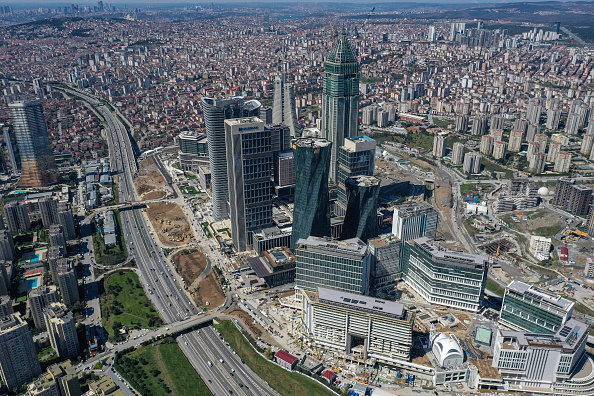The Turkish real estate market is a hive of activity in 2024, and with the “Turkish real estate market 2024” being a popular keyword, staying informed is essential. The market is teeming with opportunities, property prices surging, and an influx of foreign investors.
As a potential investor, you might be wondering how to navigate the dynamic landscape of Turkey’s real estate sector. In this engaging exploration, we’ll delve into the economic growth projections, government initiatives, and key cities driving this vibrant market.
We’ll also guide you through the lucrative rental market, share valuable investment tips, and alert you to the potential risks and challenges. Let’s embark on this journey of discovery together.
Key Takeaways
- Turkey’s real estate market is expected to grow significantly by 2024, driven by positive economic growth projections, robust government initiatives, and increasing foreign investments, particularly emphasizing infrastructure development and urban transformation efforts.The Turkish real estate market exhibits regional diversity, with cities like Istanbul, Izmir, and Ankara providing
- unique investment opportunities; Istanbul’s vibrant lifestyle and cultural value drive high property appreciation, Izmir’s economic and touristic growth presents lucrative prospects, and Ankara offers stability due to its political importance.
- Turkey is encouraging foreign investments through initiatives such as the Turkish Citizenship by Investment program and favorable currency dynamics, balancing the challenges of market fluctuations and overbuilding with strategic investment measures and local expert consultations.
Economic Outlook and Real Estate Growth
With an average GDP growth rate of 2.8% projected over the next five years, Turkey’s economic outlook is bright. This, coupled with robust government initiatives, sets the stage for significant growth in its real estate market by 2024. Foreign investment also plays a crucial role in the expansion of the market.
In 2022, foreign investors injected $5 billion into the market, representing 3.1% of all residential apartment sales.
As components of government initiatives, regional infrastructure projects, new transportation lines, and urban transformation work substantially influence the increase in property values, consequently contributing to the expansion of the Turkish real estate market.
An increase in new home prices in Turkey is anticipated in 2024, reflecting the overall growth and significant investor interest in the housing market.
Next, we’ll examine the economic growth projections and government initiatives contributing to this dynamic market.
Economic Growth Projections
The economic growth projections for Turkey indicate a 3.6% growth in 2023 and a 3.7% growth in 2024. These projections consider various factors, including the potential impact of rising interest rates on the economy and the real estate market.
These robust growth projections, higher than those for many other emerging markets, create a conducive atmosphere for real estate investment.
As Turkey’s economy thrives, it’s likely to create a ripple effect on the real estate sector, providing enticing investment opportunities for domestic and foreign investors.
With such promising economic growth projections, Turkey’s real estate market is positioned for a surge in activity in 2024 and beyond.
Government Initiatives
Government initiatives are pivotal in shaping the Turkish real estate market. The urban transformation initiative, for instance, targets housing and infrastructure challenges and has significantly contributed to the real estate market's expansion.
The Housing Development Administration of the Republic of Turkey (TOK) has constructed 1.17 million affordable houses, catering to low- and middle-income citizens and bolstering the urban transformation efforts. Despite some hurdles, these initiatives have greatly stimulated the property market.
The Turkish government has also implemented strategies to facilitate real estate investments for foreign buyers looking to buy property.
The government has increased the appeal of real estate investment in the country by streamlining the permit acquisition process for foreign buyers and their families. These initiatives and the promising economic outlook are propelling the Turkish property market to new heights.
Property Market Dynamics in Key Cities

Next, we’ll examine the property market dynamics in Turkey’s key cities. Istanbul, Izmir, and Ankara are the primary urban centers recommended for investment in the Turkish real estate market in 2024. Each city presents a unique set of opportunities and challenges for investors.
For instance, the real estate market trends in Istanbul indicate a rise in housing prices, particularly in major urban areas. The city is witnessing heightened interest from local and international buyers seeking properties in tourist-friendly areas.
In contrast, Izmir is drawing investors with its continuous economic and touristic growth, driving a rapid rise in property prices. We’ll explore the property market dynamics in these critical cities in detail.
Istanbul
Istanbul’s real estate market is characterized by its activity and diversity, with varying appreciation rates in different areas. Some of the most highly valued areas in Istanbul’s property market include:
- Kadköy
- Üsküdar
- Ataşehir
- Beşiktaş
- Sariyer
- Bakrköy
240,000$

Istanbul Europe,
Küçükçekmece,

Under construction

285,000$

Istanbul Europe,
Küçükçekmece,

Ready

200,000$

Istanbul Europe,
Küçükçekmece,

Ready

These neighborhoods are witnessing high appreciation rates, attributable to factors such as Istanbul’s business and entertainment opportunities, cultural heritage, vibrant lifestyle, high demand, limited supply of vacant land, and high occupancy rates.
The projected average property price per square meter in Istanbul for 2024 is $1432. The construction market presents excellent opportunities, emphasizing cultural experiences, long-term stability, and potential growth. With such enticing prospects, Istanbul’s real estate market continues to draw the attention of investors worldwide.
Izmir
Izmir presents compelling value for real estate investment due to its continuous economic and touristic growth. Investments in transportation linkages, such as rail transit, have a positive impact on the real estate market in Izmir, leading to an increase in residential property values. Areas like Alsancak, Karşyaka, and Bornova are particularly favored by both domestic and foreign investors.
The real estate market in Izmir is projected to show significant trends in 2024, resulting in substantial gains for investors. With its robust infrastructure and blossoming tourism sector, Izmir’s property market is ripe with potential for long-term appreciation.
Ankara
Ankara’s property market is driven by its status as the capital city and its growing population. These factors are influencing the city’s real estate market, providing stability due to the government presence and demonstrating a strategically important location, contributing to market growth.
In the last five years, Ankara’s property market has experienced significant growth, with a remarkable increase of 195.9% in house prices year-on-year in November 2022, reflecting strong market dynamics. Given its political significance and demographic expansion, Ankara offers a stable and promising environment for real estate investment.
Attracting Foreign Investors
Several exciting initiatives are drawing foreign investors to Turkey’s real estate market. The Turkish citizenship by investment program is one such initiative, offering foreign investors the opportunity to obtain citizenship by investing in residential property. Additionally, the favorable currency dynamics, with the Turkish Lira expected to weaken against the dollar, make property purchases more affordable for foreign investors, increasing potential rental returns.
The program, which requires a minimum investment of $400,000 for Turkish citizenship, has significantly bolstered the growth of the Turkish real estate market since its launch in 2017. Let’s further investigate these initiatives.
Turkish Citizenship by Investment

The Turkish Citizenship by Investment program requires a minimum investment of $400,000 in real estate. Investors who acquire Turkish Citizenship by Investment enjoy numerous benefits, including the ability to open bank accounts in Turkey, reside, work, pursue education, and engage in business activities in the country without any limitations.
The program has had a significant impact on the real estate market, leading to increased demand and prices. There is also consideration for a potential increase in the minimum investment requirement from $400,000 to $600,000, and the program offers employment opportunities for its holders.
This program is a significant draw for foreign investors, adding to the appeal of the Turkish real estate market.
Read also: Turkish Citizenship: A Strategic Gateway for Real Estate Investors
Currency Dynamics
Currency dynamics also play a key role in attracting foreign investors to the Turkish real estate market. Over the past five years, the Turkish Lira has experienced substantial fluctuations against major currencies, culminating in a record high exchange rate of 29.89 in December 2023. Goldman Sachs has projected that the Turkish Lira is expected to weaken to rates of 23.00, 25.00, and 28.00 against the dollar over various intervals within the next 12 months.
This depreciation in the lira could lead to favorable conditions for foreign real estate investments, offering more affordable acquisitions and the potential for higher rental yields. The devaluation of the Turkish Lira makes property purchases more cost-effective for foreign investors, potentially leading to increased cash sales and higher rental returns.
Rental Market and Yields

The rental market in Turkey offers attractive yields, with demand for rentals varying across cities and property types. Rental yield, defined as the annual rental income generated by a property divided by its purchase price or market value ranges from 4.1% to 6.8% in Turkey.
Demand for rental housing and commercial space in Istanbul is currently high, while popular tourist destinations like Bodrum and Izmir attract holiday rentals. Let’s delve deeper into the rental yield rates and demand for rentals.
Rental Yield Rates
Rental yield rates in Turkey range from 4.1% to 6.8%. Over the last five years, these rates have demonstrated stability, with the average gross rental yields reaching 6.52% in Q3, 2023. These yield rates are influenced by factors such as:
- Location
- Property type
- Amenities
- Currency fluctuations
- Inflation rates
- Other economic indicators
The attractive yield rates offer the potential for both long-term appreciation and immediate income.
Demand for Rentals
The demand for rental properties in Istanbul is anticipated to remain robust, primarily driven by projected population growth and expected rental yields ranging from 5% to 7%. Various factors, including economic conditions, high interest rates, currency fluctuations, and the specific location of the property, influence this demand.
In popular tourist destinations like Bodrum and Izmir, holiday rentals are projected to experience significant demand, which is expected to coincide with an increase in residential real estate prices and a rise in rental rates within these areas.
Read Also Rental ROI in Istanbul Properties
Tips for Investing in Turkish Real Estate in 2024

Strategic planning and comprehensive research are vital for successful investment in the Turkish real estate market in 2024. These steps will help you understand the significant market dynamics and trends at play. The timing of investment also plays a critical role as it is influenced by various macroeconomic indicators such as economic cycles, interest rates, and market trends.
We’ll further examine these factors.
Research and Analysis
Thorough research and analysis should precede any investment in Turkish real estate. Considering factors such as:
- Location
- Infrastructure
- Transportation
- Future potential
- Property type
- Investment timeline
can significantly impact the success of your investment. Economic and social dynamics in a region are equally important as they directly impact real estate values.
Understanding the benefits and potential drawbacks linked with different categories of real estate, including commercial real estate, can also guide property investment decisions.
Consult Local Experts
Consulting with local experts can provide valuable insights into market trends, regional dynamics, and investment opportunities. Prominent real estate professionals in Turkey, such as Number One Property, can guide investors through the purchasing process and provide a comprehensive understanding of regional characteristics and advancements in the Turkish real estate market.
Risks and Challenges in the Turkish Real Estate Market
Despite its promising opportunities in 2024, the Turkish real estate market comes with certain risks and challenges. Investors need to consider potential hurdles like market fluctuations, overbuilding, and unplanned urbanization.
Next, we’ll examine these challenges and discuss potential strategies to overcome them.
Market Fluctuations
Fluctuations are frequently observed in the Turkish property market, with significant increases and decreases in house prices and sales volume in recent years. These fluctuations are influenced by various factors, such as economic inflation and other macroeconomic indicators.
Despite these fluctuations, effective strategies, such as implementing a buy-and-hold approach, prioritizing sustainable development, and conducting comprehensive market research, can help manage these market fluctuations.
Overbuilding and Unplanned Urbanization
Overbuilding and unplanned urbanization pose significant challenges in the Turkish real estate market. They can disrupt the equilibrium between supply and demand, potentially resulting in an oversupply and reduced property prices. Challenges also encompass the necessity to guarantee access to clean drinking water, environmental concerns, and substandard living conditions arising from unplanned and uncontrolled development in urban areas.
To tackle these challenges, the government is implementing sanitation, gentrification, urban renewal initiatives, and substantial modifications to the urban planning system.
Summary
In conclusion, the Turkish real estate market in 2024 presents a dynamic landscape teeming with opportunities. The market is driven by robust economic growth, government initiatives, and a surge in foreign investment. Key cities like Istanbul, Izmir, and Ankara offer unique investment opportunities, while the rental market promises attractive yields. However, investors need to navigate potential risks and challenges, such as market fluctuations and overbuilding. With careful research, consultation with local experts, and a well-thought-out strategy, investors can successfully tap into the potential of the Turkish real estate market.
Related Articles:
Diverse Real Estate Investments in Istanbul





